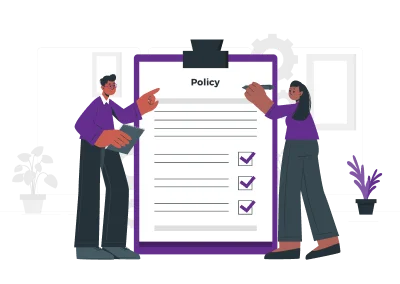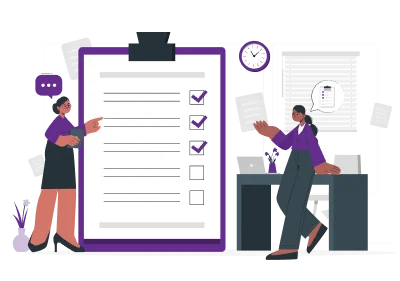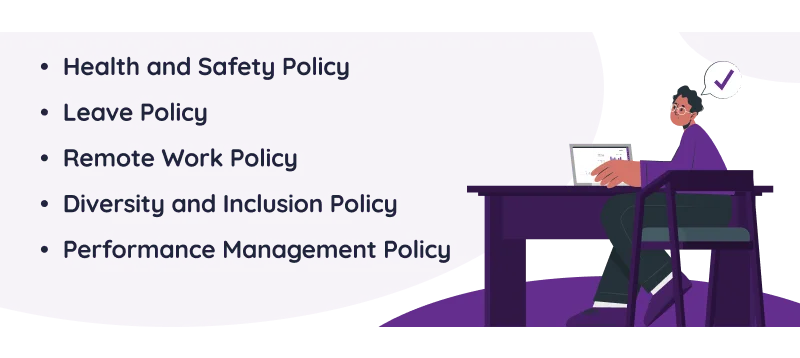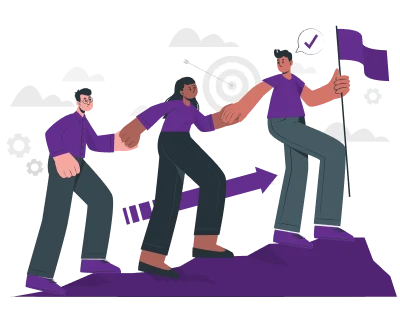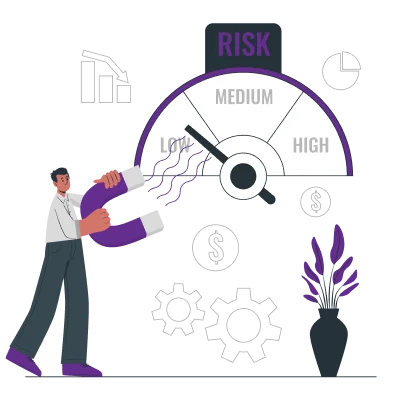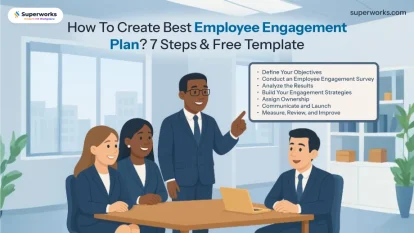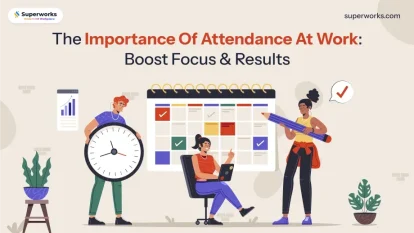HR policy and practice refer to the formal guidelines and procedures that govern the relationship between an organization and its employees. They cover areas such as recruitment, employee engagement, and compliance with laws and regulations.
Grab a chance to avail 6 Months of Performance Module for FREE
Book a free demo session & learn more about it!
-
Will customized solution for your needs
-
Empowering users with user-friendly features
-
Driving success across diverse industries, everywhere.
Grab a chance to avail 6 Months of Performance Module for FREE
Book a free demo session & learn more about it!
Superworks
Modern HR Workplace
Your Partner in the entire Employee Life Cycle
From recruitment to retirement manage every stage of employee lifecycle with ease.


Seamless onboarding & offboarding
Automated compliance & payroll
Track performance & engagement
Why HR Policies And Practices Are So Crucial Now? 5 Epic Reasons
- what are hr policies and procedures
- 14 min read
- August 20, 2024
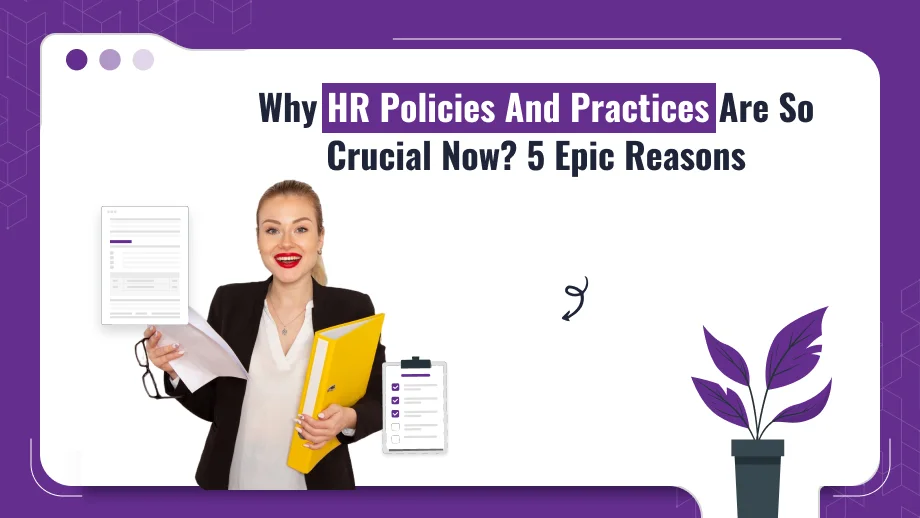
We as a reader are not quite fans of reading policies and procedures to the bottom, and that is a fact, that we can’t hide anymore. But there’s a reason behind such a long list of policies we get every time get any product or service! However, these HR policies and Practices are direly crucial, and not just for the HR managers, but also for the employees and the whole organization!
Still, the human mind keeps asking the question why are these hr policies and procedures that important for businesses? Solely, both of these are exponentially crucial to those organizations who seek to strive to adapt to evolving employee needs and the complexities of a global workforce!
These HR policies and procedures that we are talking about are essential that guide organizational success on a big scale. Here in this blog, we are going to explore 5 epic reasons why these policies are crucial in today’s workplace and how they contribute to a thriving work environment.
What are HR Policies and Practices?
HR policies and procedures are known to be the formal guidelines that govern the relationship between an organization and its employees. And if we are about to mention its cruciality then you understand that an HR policies and practices covers quite a load of areas that include;
- Recruitment,
- Employee engagement,
- Health and safety,
- Compliance,
- Performance management, and more
Furthermore, these HR policies are responsible for providing a structured framework for the organization, on which they can work with ease! And moving forward these HR policies and practices should be marked important as they ensure consistency, fairness, and transparency in employee management. Here, after getting the basic details, let’s gather the information regarding the key elements of procedures and policies!
Key Elements of HR Policies and Practices
- HR Policies: These are the official guidelines that outline how specific human resource matters should be handled within the organization, so that element should be kept in mind. The policy is the reason behind the substantial framework for decision-making, helping to align HR strategies with business objectives.
- HR Procedures: These are the detailed instructions for implementing HR policies to the core. In terms of human resource management, these procedures ensure that policies are applied properly, and followed by every employee [whether doing desk jobs or remote work], promoting a cohesive work environment.
For example, you need to understand that a health and safety policy outlines the measures in place to ensure a safe workplace. While on the other hand, a leave policy defines the rules for taking time off, such as vacation or attendance and leave management.
Hope these examples of hr policies and practices have been helpful for a better understanding for the policies that are more than crucial to know! And now when we have discussed the importance of ‘why are HR policies so crucial,’ then it’s about time to know their purpose!
Purpose of HR Policies and Practices
The primary purpose of these HR policies and procedures, to be honest, is to establish quite a fair and consistent approach to managing people within an organization. Moreover, some things need to be understood that these policies can play an exemplary role in the growth of the company because they are designed that way!
They are the literal face of the best practices in human resource management and exist to enhance employee satisfaction, boost productivity, and reduce the risk of legal disputes. Such kind of HR strategy process helps ensure compliance with employment laws, promote a positive work environment, and protect the rights of both employees and employers.
Key Objectives
- Compliance with Laws and Regulations: HR policies help organizations comply with employment laws and regulations, reducing the risk of legal issues. For example, compliance with health and safety regulations ensures a safe workplace for all employees.
- Employee Engagement: By fostering a positive work environment, HR policies and practices enhance employee engagement and retention. Policies such as flexible work arrangements and mental health support contribute to employee well-being.
- Organizational Alignment: HR policies align employee behavior with the organization’s values and objectives, promoting a cohesive work culture. For instance, a diversity and inclusion policy encourages equal opportunities for all employees.
- Risk Management: Effective HR policies and practices mitigate risks related to workplace disputes, discrimination, and harassment. Clear guidelines on acceptable behavior and dispute resolution help maintain a respectful work environment.
Key HR Policies and Procedures
In addition to that, there are several key
HR policies and practices are essential for maintaining a healthy and productive work environment. These include:
- Health and Safety Policy is there to ensure a safe working environment for all employees by outlining safety standards and procedures.
- The Leave Policy for an employee defines the rules and procedures for taking time off in the workplace, which includes vacation, sick leave, and parental leave.
- Remote Work Policy outlines the human resources guidelines for working remotely, ensuring productivity and collaboration in a remote setting.
- Diversity and Inclusion Policy promotes a diverse and inclusive workplace by encouraging equal opportunities for all employees.
- Performance Management Policy establishes the criteria for evaluating an employee’s performance and providing feedback.
These policies are in place to make sure that employees are completely able to understand their rights and responsibilities, creating a structured work environment. Because these human resources policies support both individual and organizational goals.
5 Reasons Why These HR Policies And Practices Are So Crucial
What are hr policies and procedures? We have indeed got the answer to this question, right? After getting that thoroughly, now we should move on to those 5 epic reasons why HR policies and practices are so crucial!
1. To Enhance Employee Well-Being and Engagement
Employee well-being and engagement are critical to organizational success. Employee engagement HR policies play a crucial role in promoting a healthy work environment and fostering employee engagement. A well-defined well-being policy can include wellness programs that support physical and mental health, such as fitness challenges, mental health resources, and access to counseling services.
Well-Being Initiatives: HR policies can include programs that focus on physical and mental health, such as gym memberships, health screenings, and mental health days. These initiatives support employee well-being and contribute to a positive work environment.
Engagement Strategies: By creating opportunities for growth and development, HR policies and practices encourage employees to remain engaged and motivated. For example, providing access to training programs and career development opportunities helps employees feel valued and invested in their roles.
2. To Foster a Culture of Persistent Learning
In today’s rapidly changing business landscape, continuous learning is essential even in HR service outsourcing. HR company policies and procedures that support training and development help employees acquire new skills and stay competitive. A strong emphasis on learning and development not only enhances individual performance but also contributes to organizational success.
Learning Opportunities: The HR policies and procedures list can provide access to training programs, workshops, and online courses that enhance employee skills. By encouraging continuous learning, organizations can ensure that their workforce remains adaptable and innovative.
Career Development: By offering clear career paths and advancement opportunities, HR policies encourage employees to pursue growth within the organization. For example, a policy on career progression outlines the steps and criteria for promotions and lateral moves.
Also, See: 10 Must Have Human Resource Policies For Any Organization
Bad HR policies are the cause behind high turnover rates!
Keep your employees engaged with the best employee engagement software!
3. To Strengthen the Leadership and Talent Development
Developing strong leaders and nurturing talent are crucial for organizational success. HR policies that focus on leadership development help build a capable and resilient workforce. By investing in leadership programs and talent management, organizations can ensure a steady pipeline of future leaders.
Leadership Programs: HR policies can include leadership training and mentorship programs that prepare employees for managerial roles. These programs containing HR compliance best practices, focus on developing key leadership skills, such as communication, decision-making, and team management.
Talent Management: By identifying high-potential employees and providing targeted development opportunities, HR policies help build a pipeline of future leaders. Succession planning and talent assessments are examples of HR practices that support talent development.
4. To Provide Needed Support to Remote and Hybrid Work Models
The shift to remote and hybrid work models requires new HR policies and practices to ensure productivity and collaboration. As more organizations embrace flexible work arrangements, HR policies play a critical role in supporting remote teams and maintaining organizational cohesion.
Flexible Work Arrangements: HR policies and practices can offer flexible work options, such as remote work and flexible hours, to accommodate employee needs. For instance, a remote work policy outlines the expectations for remote employees, including communication protocols and performance metrics.
Technology Support: By providing the necessary tools and resources, HR policies and best practices in human resources help employees work effectively in a remote environment. Access to collaboration tools, cybersecurity measures, and technical support are essential components of remote work policies.
5. To Ensure Proper Compliance and Risk Avoidance
Compliance with laws and regulations is a top priority for organizations, HR policies and practices help mitigate legal risks and ensure ethical business practices. By establishing a compliance framework, HR policies protect both employees and employers from legal disputes and reputational damage.
Compliance Framework: HR policies establish clear guidelines for compliance with employment laws, reducing the risk of legal disputes. For example, a compliance policy outlines the organization’s commitment to adhering to labor laws, anti-discrimination regulations, and data protection standards.
Ethical Standards: By promoting ethical behavior and accountability, HR policies and practices help create a culture of integrity and trust. Policies on code of conduct, whistleblower protection, and conflict of interest are essential for maintaining ethical standards.
How to Write an Effective HR Policy?
Here is an example of an HR Policy that every company should have!
HR Policy on Workplace Conduct
Effective Date: September 1, 2024
Last Revised: [Date]
Responsible Person: Radha Kulkarni, HR Director
Purpose
To set expectations for professional behavior and ensure a respectful, productive work environment.
Policy Statement
- Professional Behavior: Employees must maintain professionalism, courtesy, and respect in all interactions. Disruptive or hostile behavior is prohibited.
- Anti-Harassment: The company prohibits all forms of harassment, including sexual harassment and discrimination. Violations will be addressed according to company procedures.
- Attendance and Punctuality: Employees should be punctual and maintain regular attendance. Notify your supervisor of absences as soon as possible.
- Substance Abuse: Illegal drugs and alcohol are prohibited on company premises. Employees suspected of being under the influence will face disciplinary action.
- Confidentiality: Maintain confidentiality of sensitive information and respect colleagues’ privacy.
- Dress Code: Dress appropriately for your role and work environment.
Scope and Applicability
Applies to all employees of [Company Name], including full-time, part-time, and temporary staff, during work hours and while representing the company.
Responsibilities
- Employees: Adhere to this policy and report violations.
- Supervisors: Enforce the policy and address issues.
- HR Department: Provide training, handle complaints, and enforce the policy.
Compliance
Non-compliance may result in disciplinary action, up to and including termination.
Contact Information
For questions, contact Jane Doe, HR Director, at [Company Name].
Note: You can download directly from here and edit as per your need.
Here is the list of policies that every HR needs!
Well, many people stay in doubt for a long time, when they have to write an effective HR policy! And that is why here we are availing the secret format of HR policies and that too not for one but 10 most common HR policies that you just have to get in your workspace! So, let’s have a look over all those policies and their effective format!
1. Overtime Policy
People do work more when they have a crucial project lined up, and they have to complete it before the deadline can hit them! In such cases, they choose to work more than working hours, right? And right there when your employees do the overtime there should be a proper policy regarding paying them, right? So, here it is:
2. Leave Policy
There can be an employee who will ask for a leave right? Or, wait a minute which employee doesn’t take a leave? All of them at some point in time will require a leave, and for that too you should have a firm policy right? So, here it is:
3. Public Holiday
Every nation has its own set of public holidays, right? But to be honest, different companies have different rules regarding timings and leaves on public holidays, hence they should also have a policy regarding that, right? So, here it is:
4. Employee Termination Policy
Terminating an employee is a sensitive topic, and there should be a specific reason behind that, more importantly, it should be done completely in a professional way. Hence, there should be a policy just so everyone can follow the rules of termination properly. So, here it is:
5. Sexual Harassment Policy
Sexual harassment is a crime, there can’t be any other description or easy word to mention that, and regardless of the excuse it is intolerable at any cost! Hence, to take some strong actions, and pre-informing [or giving warning] to each & every employee, there should be a policy, right? Here it is:
Sexual Harassment Policy
6. Exit Interview Policy
Times when your employee is about to exit your company for some reason is delicate and you should handle it with care. However, what if all the things that we are about to do are already predefined [like whatever you have to do and say is already pre-written in policy], hence there’s a policy specifically for that, please check it out:
7. Maternity Policy
Newly moms-to-be, means your female staff that are about the take a big leap forward in their lives and have planned a baby. They surely will require some leave, some care, and some attention, so what should be done and how? This is the question that many HR managers still ask, hence, we have availed a proper policy for that, please check it out:
8. Disciplinary Policy
There should be proper discipline in your workspace, do you agree? Of, course you will, who won’t? Hence, there should be some rules that your employees should know, so forward them this policy and let them know:
9. Data Protection Policy
Your employees have access to the internet, and there’s a consistent sharing and storing of data for work purposes. But that is highly crucial for your company, right? Hence that data should be protected, and there’s a policy that will make sure to keep it that way, please check it out, and forward it to your employees!
Data Protection Policy
10. Leave Encashment Policy
There are predefined sets of annual leaves that any employee can avail as per their need, but what if they don’t? At such time, the company encashes their leaves as per their rules, and the employee will get the money in return for that, so this policy sets rules and boundaries for that, check out:
Superworks- Best HRMS payroll software in India
Throughout the blog, we have listed all the potential information that you need to have about HR policies, including the details regarding Saas hr management systems! But as soon as you have seen all that information, you may start looking for a convenient software that may work accordingly, with your company’s HR policies and practices and practices, right?
So, let us tell you about that, an amazing HRMS software company, that is becoming the first choice of HR managers, Superworks! Here, with the numerous advanced HR features, this platform directly streamlines the work of HR in the most seamless way possible. With easy customization, it also accompanies with company’s HR policies and practices, so start losing stress, and start using Superworks!
Also See: HR planning | fixed component in salary
FAQs
What is HR policy and practice?
What are the six types of HR policies?
- Recruitment Policy: Guidelines for hiring and onboarding new employees.
- Health and Safety Policy: Standards for maintaining a safe work environment.
- Leave Policy: Rules for taking time off, including vacation and sick leave.
- Remote Work Policy: Guidelines for working remotely and maintaining productivity.
- Diversity and Inclusion Policy: Promotes equal opportunities for all employees.
- Performance Management Policy: Criteria for evaluating employee performance.
What are those 6 key HR practices of an HR plan?
- Talent Acquisition: Attracting and hiring the right talent.
- Employee Development: Providing training and growth opportunities.
- Performance Management: Evaluating and improving employee performance.
- Compensation and Benefits: Where we get competitive pay and benefits.
- Employee Engagement: Fostering a positive work environment.
- Compliance Management: Ensuring adherence to laws and regulations.
What are the HR function policies?
HR function policies refer to the specific guidelines and procedures that govern various HR functions, such as recruitment, employee development, and performance management. These policies ensure consistency and alignment with organizational goals.
